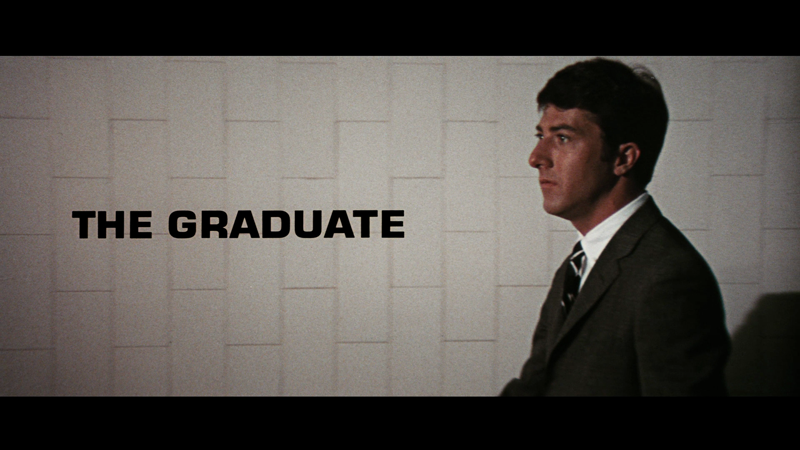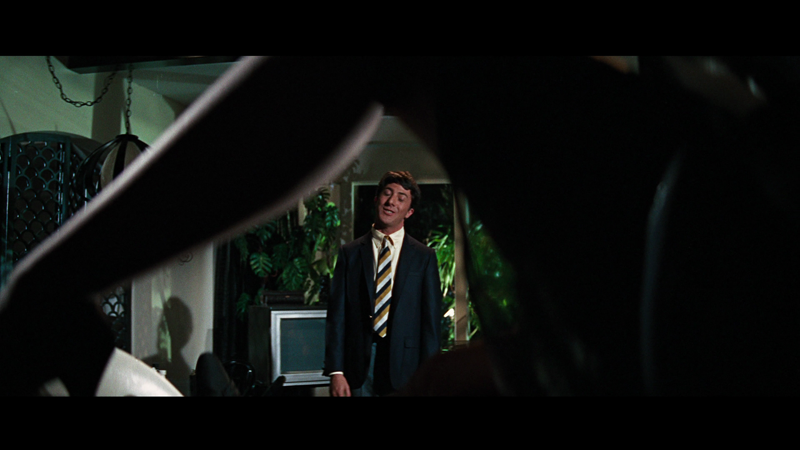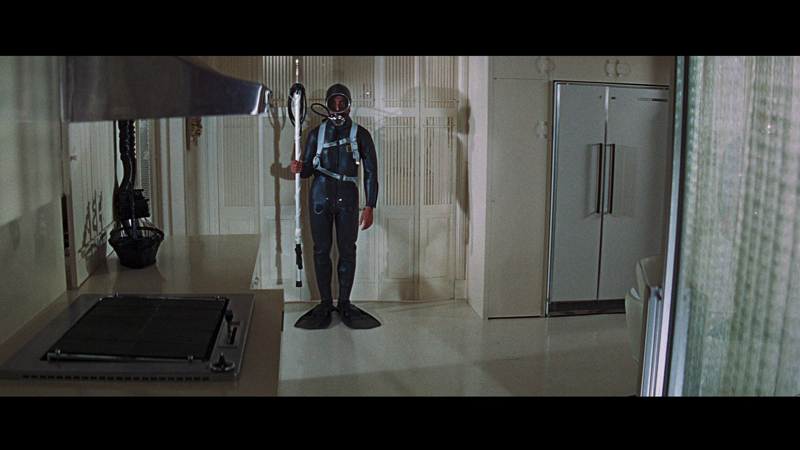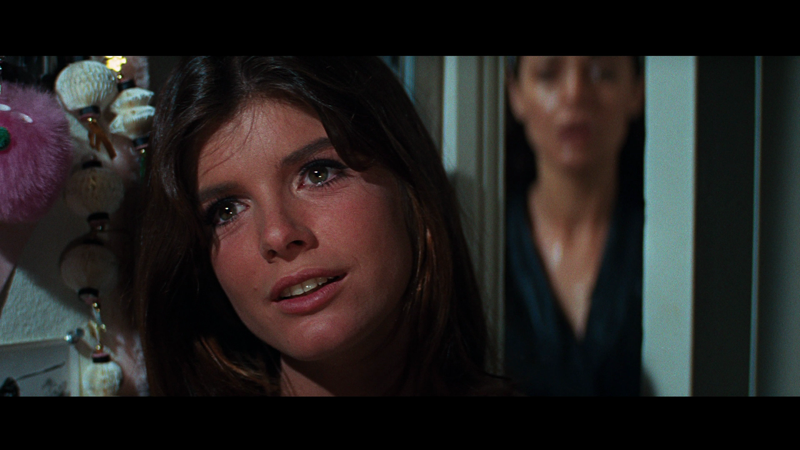| Reviews & Columns |
|
Reviews DVD TV on DVD Blu-ray 4K UHD International DVDs In Theaters Reviews by Studio Video Games Features Collector Series DVDs Easter Egg Database Interviews DVD Talk Radio Feature Articles Columns Anime Talk DVD Savant Horror DVDs The M.O.D. Squad Art House HD Talk Silent DVD
|
DVD Talk Forum |
|
|
| Resources |
|
DVD Price Search Customer Service #'s RCE Info Links |
|
Columns
|
|
|
Graduate, The
Facing an unsure future

Loves: The Criterion Collection, older women, Anne Bancroft, visual artistry
Likes: Mike Nichols, Dustin Hoffman
Dislikes: Navelgazing
Hates: Self-absorption
The Movie
The allure of the older woman is one that has grown in popularity in recent decades, as it's thought that with age comes experience, and that experience is invaluable in certain pursuits. There's also the belief that an older woman has gotten past the games that younger women are known for playing, and knows what they want. I don't know when exactly this ideal (perhaps fetish) took hold, but it wouldn't be hard to point to Anne Bancroft for popularizing it with her performance as Mrs. Robinson in The Graduate. After all, the name Mrs. Robinson has taken on the meaning of the sexually-desirable older woman since the film's release. But despite her dominating presence, The Graduate isn't her story. It's Ben's.
Returning home to California after graduating college on the east coast, Ben (Dustin Hoffman) has hit a wall. Not knowing what to do next, he enters a stage of ennui, established masterfully by director Mike Nichols and his team through an opening that portrays him as a product on a conveyor belt before dropping him into a maelstrom of a dinner party that he responds to with the minimal of interest and energy. But then we get a glimpse of the alluring Mrs. Robinson in the background, and she quickly makes her presence felt by getting Ben to give her a ride home. An aggressive attempt to sleep with him, marked by the legendary line "Mrs. Robinson, you're trying to seduce me", seen spoken through the crook of Bancroft's bent knee, changes everything for Ben.
The confusion and frustration Ben experiences thanks to his emotionally unfulfilling, purely physical affair only grows when he is introduced (at Mrs. Robinson's husband's insistence) to Elaine (Katharine Ross), Mrs. Robinson's daughter, and falls head over heels for her. Mrs. Robinson wants her lover to stay away from her little girl, but Ben and Elaine have a mutual attraction, which naturally creates some real issues, especially with someone as controlling and manipulating as Mrs. Robinson. This puts Ben on a hunt for a happiness that may not be available, which makes up the bulk of the second half of the film.

As important as Hoffman and his uncertainty is to the film, Bancroft as Mrs. Robinson is the key, delivering a captivating performance that alternates between unimpeachably confident and haltingly vulnerable--the perfect person to shepherd Ben into a confusing adulthood. Her presence is so dominant and secure that a viewer can believe any reaction she elicits from Ben, be it lust, awe or anger. When that steel curtain is pulled back a bit, revealing a bit of the heart beating beneath her cool exterior, the contrast is so striking that it only serves to put the audience further in Ben's shoes, as one can't be certain about much of anything. Meanwhile, Ross, both as an actress and her character, gets the unenviable spot of having to be compared to Bancroft, which dims her spotlight, despite some impressive work, including two wordless moments that are absolutely heartbreaking.
Great performances aside, The Graduate is truly impressive for its aesthetics, as Nichols, directing a talented crew, set new standards for both visuals and sound. Elements than are now taken for granted in cinema were established in building the film's world, including precisely shot and edited montages that blend disparate parts of Ben's world into a cohesive whole and illustrated his disconnect with life, beautifully composed frames and artfully designed visually themes, which enhance the story and characters without hammering audiences over the head. The audio is similarly valuable in communicating to the audience on a more subconscious level without complicating the surface messaging, with a masterful use of silence or limited sound for emphasis, while the music of Simon and Garfunkel assists in establishing tone and emotion, acting as both score and dialogue at times, with folk songs like "Songs of Silence", "Scarborough Fair" and "Mrs. Robinson" creating a plaintive mood that ties in well with Ben's situation.
Though the film overall is brilliant and feels wholly authentic, the core relationship between Ben and Elaine in the final third of the film makes little sense. There seems to be little to no logical motivation for how the main characters behave, which is a definite problem for a film that, until this point, felt a part of the real world. Though this can give pause if you think about it, of course, the argument could be made that in matters of love, logic holds no power, and people rarely act in ways that make sense. It's that very fact that makes the film's final shot such a powerful, memorable moment. The effect of the entire film relies on this one moment, and The Graduate nails the dismount, putting the perfect button on a fantastic film.

The Disc
The Graduate arrives on one Blu-ray disc in Criterion's standard clear Blu-ray-height keepcase with an attractive (if predictable) cover and an 8-page fold-out pamphlet. The classic Criterion menu, using an iconic scene and audio clip from the film, gives the choice to watch the film, navigate the timeline, select scenes, adjust the setup and check out the special features. Audio options include a new English DTS-HD Master Audio 5.1 track and an English LPCM 1.0 track, while English SDH subtitles are available.
The Quality
The 1080p, AVC-encoded superwide 2.37:1 transfer comes from a 4k scan of an original 35mm color negative, which was color-timed against an HD master approved by Nichols. The results are gorgeous, with bright, vibrant color (where appropriate) and an impressive level of fine detail, not to mention a consistent grain presentation, ensuring it looks like a film of its age, but not an aged film. Black levels are, with very minor exceptions, solid throughout, and there are no issues with dirt or damage, nor any digital distractions.
This is the rare occasion where the classic might be outdone by a newcomer. The Graduate is a film where sound plays a major role, and both tracks made available by Criterion can make a case for being the right choice. The original LPCM 1.0 audio was remastered from original 35mm magnetic audio tracks, and it sounds crisp and strong, with no obvious defects, presenting the film as it was intended. However, the 5.1 track, created with Nichols' approval from the 35mm magnetic tracks and original soundtrack recordings, has more room to play, and the effect is obvious, particularly when it comes to the film's iconic soundtrack, which makes good use of the additional channels to allow elements to stand on their own and create a fuller sound. When you take the imaginative filmmaking in display into consideration, one can imagine that if Nichols had had the opportunity to utilize such technologies when he originally made the film, he would have done so.
The Extras
There are a pair of commentaries on this release, starting with a track pairing Nichols with director Steven Soderbergh. While Soderbergh essential acts as an interviewer, prodding Nichols with prompts to discuss the film, leading to production stories, behind-the-scenes details and talk of themes, the track becomes two filmmakers comparing notes on the process, like old buddies sharing war stories. For film fans, it's an excellent opportunity to listen in on two greats talk cinema.
A second commentary track hails from way back in 1987, off the original Criterion laserdisc of The Graduate, with UCLA film scholar Howard Suber offering his thoughts on the imagery and themes in the film. It's a very academic track, read from a script, but it's packed with info and intricate in its analysis of the film, with a few entertaining asides as well, making it a fascinating and enjoyable listen for those interested in film theory.
"Buck Henry and Lawrence Turman" (24:56) is a new 2015 conversation between the film's screenwriter and producer. Among the topics the two adorable, elderly men cover are the movie's literary origins, their own personal connections to the material, the credit fight over the screenplay, issues with the film's original, now-famed cinematographer and the development of the film's ending. There's some great behind-the-scenes info in here, including the story of Gene Hackman's involvement in the film and what working with Nichols was like.
A new 2015 interview with Hoffman (37:50) follows, in which he talks about how he got the role, how his childhood informed his performance and what it was like coming up in the theater when he did. Among the highlights are the story of his first time putting the moves on a girl (a tale involving blackface), the real reason why he was excited to work with Bancroft, the truth behind the iconic climactic scene and his idea for a sequel.
"Sam and Mike" (26:13) offers Bobbie O'Steen--widow of The Graduate editor Sam O'Steen, and a talent in her own right--the chance to look at Sam's work on the film and with Nichols. Bobbie starts with their meeting on Nichol's first film and discusses the film's development from a crew perspective, before utilizing specific scenes to illustrate how the two men (as well as DP Robert Surtees) worked together and the art they accomplished. Access to a line script lets Bobbie go into detail on editing choices that were made, and how they affected the film. There's tremendous insight here, including how a decision and accident on-set resulted in one of the most iconic moments in the film (if not cinema.)
From 2007 comes Students of "The Graduate" a 25:58 documentary, featuring Harold Ramis, Marc Forster, Henry Rollins, Valerie Faris and Jonathan Dayton and David O. Russell, as well as Turman, Henry, Bobbie O'Steen and a handful of experts. Though it's ostensibly about the film's ongoing influence, it's really more of an appreciation and analysis of the film by creatives who were spurred by the movie and the experts, from the worlds of cinema, music and more, who admired it. In light of some of the other info in these extras, Ramis' last note is amusing in a "hindsight is 20/20" kind of way.
"The Graduate at 25" (22:40) was a look back at the film released in 1992, including interviews with Hoffman, Henry, Turman and, for the first time on this release, Ross. An aged-looking full-frame piece, it covers some of the same ground as the other supplements here, but still manages to reveal some new info. It also includes a screen test by Ross and a clip of Henry pitching a sequel to the film from Robert Altman's The Player. It's interesting to see the three men change over 24 years over the course of this disc, while their memories remain mostly consistent.
Nichols is interviewed by Barbara Walters in 1966 in a 15:34 sitdown for Today. In the wide-ranging chat, the charming director, between puffs on his cigarette, talks about plays, movies, indulgences and performing, as well as his personal background. It's amazing to think that on TV you could once air an interview this long without any B-roll. Following that, we get to hear from Paul Simon, on a 1970 episode of The Dick Cavett Show (5:29) as he talks about the use of his music in the film, including a mention of a run-in with Mel Brooks and, strumming on his guitar, an explanation of how "Mrs. Robinson" came to be.
Screen tests for people who didn't get the part are always fascinating, because they give a peek into an alternate universe. Here, we get to see screen tests (13:18) for the riles of Ben and Elaine with Tony Bill and Jennifer Leak and Robert Lipton and Cathy Carpenter, as well as the final pair, Hoffman and Ross. Though it's obvious that Hoffman and Ross were the right choices, these tests aren't exactly a fair comparison, with the first two being one dramatic scene, while Hoffman and Ross perform a different, extended scene, which includes some material that isn't in the film, making it a curiosity worth looking at.
The film's trailer (3:46), which shows some of the artistry seen in the film, but it reveals far too much about the movie, like a condensed version of the film. Honestly, it must have been incredibly disappointing to watch this and then the film at the time, as the trailer lays out the entire plot from start to finish. ,p> Not everything from the previous MGM releases has made the transition to the Criterion edition, unfortunately, so the commentary with Hoffman and Ross is unavailable here, nor is the short featurette "The Seduction." As of now, you can pick up a DVD with those features for pretty cheap, but it's still a bit disappointing.
As is the norm for Criterion, the 12-page insert in the package includes info about the film and the disc, as well as an essay by critic Frank Rich, which covers some background on the film's production, as well as its place in the cultural revolution of the late ‘60s/'70s.

The Bottom Line
A touchstone of modern film, The Graduate is an unassailable classic--the kind of film that unites populist viewers and the artistic-minded critics in praise. Part of it is the universality of the main character, part of it is the prurient nature of the story, but mainly it's the result of a tale told well, a coming-together of writing, acting, directing and, perhaps most importantly, music, to create crowd-pleasing art. Despite the decades that have passed since Mike Nichols first brought it to the world, it hasn't aged a bit, remaining the brilliant character study it's always been. Criterion has done its usual terrific job, matching an excellent presentation with a wealth of bonus content, both old and new (though some previously-released content is not included.) It's the kind of release that everyone should own, whether they are new to the film, with the enviable opportunity to experience it for the first time, or a long-time fan looking to get the best release the film has seen to date.
Francis Rizzo III is a native Long Islander, where he works in academia. In his spare time, he enjoys watching hockey, writing and spending time with his wife, daughter and puppy.Follow him on Twitter
*The Reviewer's Bias section is an attempt to help readers use the review to its best effect. By knowing where the reviewer's biases lie on the film's subject matter, one can read the review with the right mindset.
|
| Popular Reviews |
| Sponsored Links |
|
|
| Sponsored Links |
|
|
| Release List | Reviews | Shop | Newsletter | Forum | DVD Giveaways | Blu-Ray | Advertise |
|
Copyright 2024 DVDTalk.com All Rights Reserved. Legal Info, Privacy Policy, Terms of Use,
Manage Preferences,
Your Privacy Choices | |||||||












